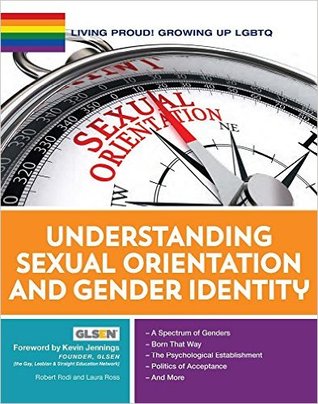 Yes, that is an actual quote, from the newly published children’s non-fiction book (copyright 2017!) Understanding Sexual Orientation and Gender Identity. It’s is just one book in a series from GLSEN under the banner “Living Proud!”
Yes, that is an actual quote, from the newly published children’s non-fiction book (copyright 2017!) Understanding Sexual Orientation and Gender Identity. It’s is just one book in a series from GLSEN under the banner “Living Proud!”
This book is hot mess, y’all. Such a mess that I need to rant about it.
Despite what the title implies, the vast majority of Understanding Sexual Orientation and Gender Identity is very specifically focused on the topic of ‘homosexuality’. Which, that’s a perfectly fine topic for a book and all, but it’s not great for one that claims to be about sexual orientation generally, let alone sexual orientation *and* gender identity.
Gender identity is addressed only in the first chapter of the book, “The Origins of Sexual Orientation and Gender Identity”. Right off the bat, we learn that the definition of gender identity is “A person’s self-image as either a male or a female, no matter what gender they were assigned birth”.
Oh, yes. We are off to a fabulous start, folks.
The book is, unsurprisingly, relentlessly binary in its discussion of both sex and gender, with the exception of a special text box acknowledging that intersex people exist. The paragraph on intersex people concludes that “many intersex people live happy and satisfying lives outside of the ‘normal’ female and male gender identities,” which is the only inkling we get that non-binary genders exist at all.
So much for “understanding gender identity” then. How about sexual orientation?
As I mentioned above, for the most part the book really only talks about homosexuality.
Outside of uses of the LGBT initialism, bisexuality is mentioned a grand total of four times:
- in the opening glossary, within the definition of ‘sexual orientation’ (which provides the options of heterosexual, homosexual, bisexual, and asexual (which, yay ace visibility for once, I guess!?))
- in the phrase “gay, straight, bisexual, asexual, transgender or questioning”, shoehorned in suddenly at the end of a paragraph about the importance of the nature versus nurture debate around ‘what causes homosexuality?’
- in reference to Freud’s (*sigh*) theory that everyone is bisexual
- in the phrase “Lesbian, Gay, Bisexual, and Transgender Pride Month”, in an image caption.
Asexuality’s only mentions are the two mentioned above. It doesn’t even merit an entry in the “Series Glossary” (a list of vocabulary words from the Living Proud! series, many of which do not appear in this particular book), or the index.
In fact, a full three out of the four chapters of the book are explicitly focused on homosexuality/being gay. First we have “Born Gay: Biological Theories of Homosexuality”, which concludes with a quote from Dr. Qazi Rahman, who states “as far as I’m concerned, there is no argument any more – if you are gay, you are born gay.”
Contradictorily, the next chapter (“Becoming Gay: Psychological Theories of Homosexuality”) concludes that “…human behavior is such a complex combination of mind and brain – the psychological and the biological working together – that it is nearly impossible to separate the two”, before segueing into the question for our final chapter: “Why Does It Matter?”
This last chapter provides a broad overview of the ways in which the question of choice with respect to sexual orientation has been rhetorically important to LGBT (or, since transgender people aren’t mentioned at all in this chapter, LGB) civil rights struggles.
I do want to be clear here; much of the content of this book is totally fine, and some is even pretty ground-breaking for a children’s book! But I have no idea how a book primarily focused on the nature/nurture debate about homosexuality wound up with such a misleading title.
Better yet, one of the other titles in the series is Being Transgender, which has the same authors as Understanding Sexual Orientation and Gender Identity, because why bring in transgender people to write a book when demonstrably uninformed cis people can do it, I guess? I may need to review that one one I can get my hands on it as well.